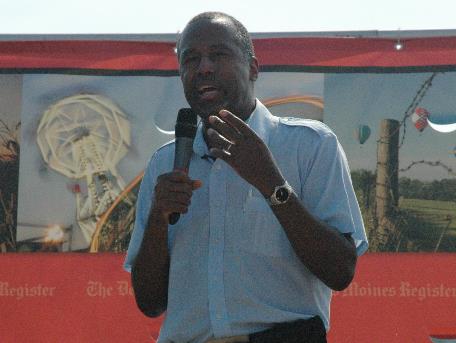DES MOINES, Iowa, Aug. 25, 2015 - Many of the 2016 presidential candidates naturally are reluctant to outline specific policies this early in the campaign – particularly when GOP front-runner Donald Trump’s lack of positions seems to be helping him surge in the early polls, rather than hurting.
| Where do they stand on the RFS? | |
| End RFS Now | End in 2 Years |
| Rand Paul | Ted Cruz |
| George Pataki | Scott Walker |
|
|
|
| End “Over Time” | Keep As Is |
| Jeb Bush | Chris Christie |
| Carly Fiorina | Hillary Clinton |
| Bobby Jindal | Lindsey Graham |
| John Kasich | Mike Huckabee |
| Rick Perry | Rick Santorum |
| Ben Carson | |
|
| |
| Expand | |
| Martin O’Malley | |
|
| |
But in response to months of persistent questioning in ethanol-producing Iowa, most candidates have been pinned down on the federal Renewable Fuel Standard (RFS), which supports ethanol and other biofuels by requiring refiners to blend specified amounts of the products with gasoline and diesel. However, some of their answers on renewables are still open to interpretation.
Mobbed at the Iowa State Fair last week, former Hewlett-Packard CEO Carly Fiorina fielded a stream of questions and promised one ethanol producer to visit his plant. She told a questioner that while she supports renewables, “ultimately the government should be out of the business of picking winners and losers and subsidizing certain kinds of energy over others . . . Government shouldn’t be engaged in setting markets and setting prices. We have to phase it all out over time.”
Former Texas Gov. Rick Perry, Louisiana Gov. Bobby Jindal and Texas Sen. Ted Cruz echoed the GOP mantra of relying on markets rather than “picking winners and losers.” Yet, they want to end the RFS but not “pick on ethanol.” So they call for ending support for ethanol only as part of ending all federal mandates and subsidies, including subsidies for oil, natural gas, coal and nuclear power.
Cruz told a questioner that he supports “ethanol and biofuels and all of the above” but that “right now there is considerable demand for ethanol in the markets and I think without a federal mandate, ethanol will continue to be demanded by the refiners; it is competitive in the markets, and we don’t need it mandated by the federal government.” He added that “I would end mandates for everything else as well . . . I think that any subsidies directed at any particular form of energy should be ended.”
Similarly, Fiorina said that “by 2020 the government should be out of all of the tax credit and subsidies business, whether it is for sugar or oil or renewable fuels.”
 Ben Carson provides another variation. The retired neurosurgeon would end the RFS “over time” but support “taking that $4 billion a year we spend on oil subsidies” and using it instead for “new fueling stations” with blender pumps to increase biofuels use.
Ben Carson provides another variation. The retired neurosurgeon would end the RFS “over time” but support “taking that $4 billion a year we spend on oil subsidies” and using it instead for “new fueling stations” with blender pumps to increase biofuels use.
Democratic hopeful Martin O’Malley sees the RFS as central to his goal of a “100 percent clean electricity by 2050” and says increasing the RFS mandate will help “make our economy grow.” Along with a stronger RFS mandate, the former Maryland governor calls for ending all fossil fuel subsidies.
Using her entire 20 minutes on The Des Moines Register Soapbox stage at the Iowa fair for questions, Fiorina answered an offshore oil-drilling query by pledging that “We will be, under a President Fiorina, the global energy powerhouse of the 21st century.” She said this powerhouse will include “ethanol, renewable fuels, drilling, exporting, natural gas, whatever it is.”
Also devoting all 20 minutes on the Soapbox to questions, New Jersey Gov. Chris Christie said, “On the Renewable Fuel Standard, we should enforce the law that’s on the books right now, the law is there and it’s this Obama administration that refuses to enforce the law on the Renewable Fuel Standard.”
Fiorina blasted critics who cite climate change to “tell us that we can’t do this, we can’t drill, we can’t keep the coal industry growing.” Saying that attacking fossil fuel use “is about ideology, it is not about science,” she said the answer to concerns about climate change and
 economic growth “is innovation, not regulation.” Rather than dispute climate scientists who insist that climate change is real and man-made, she said the same scientists “also tell us this: A single nation acting alone will make no difference at all.” She did not mention that the Obama administration is actively pursuing international agreements to tackle climate change and has already secured significant commitments from China.
economic growth “is innovation, not regulation.” Rather than dispute climate scientists who insist that climate change is real and man-made, she said the same scientists “also tell us this: A single nation acting alone will make no difference at all.” She did not mention that the Obama administration is actively pursuing international agreements to tackle climate change and has already secured significant commitments from China.
Without going into specifics, Sen. Bernie Sanders, who is seeking the Democratic nomination, promised that as president he would “transform our energy system” to address man-made climate change which he said “is already causing devastating problems in our country.”
Former Arkansas Gov. Mike Huckabee answered a question about ethanol and renewable fuels by explaining that as a conservative Republican he supports both. He said “we can’t just pull the rug out” from under the renewable fuels industry “because it was the government that asked the American farmers to engage in this process.”
“This is one of the reasons that I’m running for president,” Huckabee said. “It’s time for somebody to understand that when America makes a promise, it ought to keep it,” whether it’s a promise about renewable fuels, veterans’ benefits, Social Security or Medicare.
Former Secretary of State Hillary Clinton has called for transforming the U.S. energy industry as part of the need to tackle climate change. She promises that her administration would reduce carbon emissions by installing half a billion solar panels by the end of her first term and creating enough renewable energy to power every American home within 10 years.
 As Agri-Pulse reported in July, Clinton is a biofuels supporter, explaining that “the United States can and must be the clean energy superpower for the 21st century. . . Yet there are still some here in America – even candidates for president – who want to keep the deck stacked for the fuels of the past. They support wasteful subsidies for oil and gas, block investments in new clean technologies, and even deny the science of climate change.” She adds that “The United States should also continue supporting – and improving – the Renewable Fuel Standard.”
As Agri-Pulse reported in July, Clinton is a biofuels supporter, explaining that “the United States can and must be the clean energy superpower for the 21st century. . . Yet there are still some here in America – even candidates for president – who want to keep the deck stacked for the fuels of the past. They support wasteful subsidies for oil and gas, block investments in new clean technologies, and even deny the science of climate change.” She adds that “The United States should also continue supporting – and improving – the Renewable Fuel Standard.”
The coalition says that this year’s threat of an RFS phase-out already has led to “over 800 layoffs at John Deere, to $13.8 billion in investment shortfalls, to lower corn prices and farmland values.”
#30
For more news, go to: www.Agri-Pulse.com
